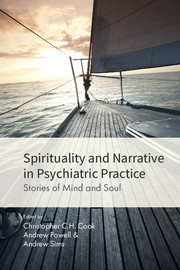Book contents
- Frontmatter
- Contents
- List of contributors
- Foreword
- Preface
- 1 Narrative in psychiatry, theology and spirituality
- 2 Spirituality and transcultural narratives
- 3 Psychopathology and the clinical story
- 4 Helping patients tell their story: narratives of body, mind and soul
- 5 Gods lost and found: spiritual coping in clinical practice
- 6 Stories of joy and sorrow: spirituality and affective disorder
- 7 Stories of fear: spirituality and anxiety disorders
- 8 Stories of transgression: narrative therapy with offenders
- 9 Narratives of transformation in psychosis
- 10 My story: a spiritual narrative
- 11 God's story revealed in the human story
- 12 Meaning without ‘believing’: attachment theory, mentalisation and the spiritual dimension of analytical psychotherapy
- 13 Stories of living with loss: spirituality and ageing
- 14 Beginnings and endings
- Index
7 - Stories of fear: spirituality and anxiety disorders
Published online by Cambridge University Press: 02 January 2018
- Frontmatter
- Contents
- List of contributors
- Foreword
- Preface
- 1 Narrative in psychiatry, theology and spirituality
- 2 Spirituality and transcultural narratives
- 3 Psychopathology and the clinical story
- 4 Helping patients tell their story: narratives of body, mind and soul
- 5 Gods lost and found: spiritual coping in clinical practice
- 6 Stories of joy and sorrow: spirituality and affective disorder
- 7 Stories of fear: spirituality and anxiety disorders
- 8 Stories of transgression: narrative therapy with offenders
- 9 Narratives of transformation in psychosis
- 10 My story: a spiritual narrative
- 11 God's story revealed in the human story
- 12 Meaning without ‘believing’: attachment theory, mentalisation and the spiritual dimension of analytical psychotherapy
- 13 Stories of living with loss: spirituality and ageing
- 14 Beginnings and endings
- Index
Summary
Personal faith and a spiritual perspective are important to many people, who can describe a sense of hope, meaning and purpose as a result of their beliefs. As well as providing guidance in everyday life, their faith may provide encouragement and support during difficult times such as illness. A pattern can be given to the day or week through meditation or prayer, readings from a holy book, or attendance at communal worship or groups. The person may adhere to the tenets of one or other of the world's religions, or their spirituality can more reflect their personal views.
For people who have a personal faith, or for whom a spiritual outlook is important, mental health problems can affect the content of their spiritual experiences. Likewise, a person's spiritual beliefs can affect how they experience mental health difficulties. Personal beliefs can be a positive and helpful resource, but sometimes aspects of faith can become unhelpfully drawn into the difficulties faced during times of distress.
Narrative as an approach
Mental health difficulties are commonly associated with stigma and an avoidance of discussing problems with practitioners, family and friends (Rose et al, 2007). This can prevent individuals benefiting from being able to share their story with a trusted other. Whether shared with others or held privately, individuals have an internal narrative that aims to make sense of their experiences. However, since many people know little about mental and physical health problems, that narrative may contain significant errors and misunderstandings (Fagerlin, 2010). A helpful clinical approach is one that both supports an accurate and adaptive narrative that accurately identifies problems, and provides explanations as to why the person feels as they do, what they can do about it and how they might expect things to progress (Hagger & Orbell, 2003).
This chapter describes how cognitive–behavioural therapy (CBT) can be used to make sense of some very different personal responses to a mental health crisis. In matters of faith there is often a tension between belief and behaviour. Since CBT focuses similarly on thoughts and actions, it can be used sympathetically and helpfully with those who hold spiritual beliefs, providing a useful framework for understanding and integrating a spiritual perspective into treatment and thus facilitating a whole-person intervention (Beck, 1991).
- Type
- Chapter
- Information
- Spirituality and Narrative in Psychiatric Practice , pp. 82 - 93Publisher: Royal College of PsychiatristsPrint publication year: 2016



